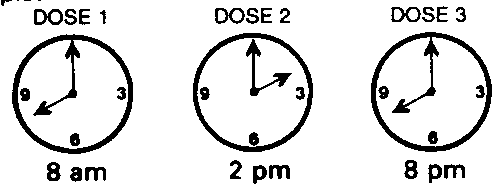
PATIENT INFORMATION LEAFLET
ON 'HALFAN' TABLETS
|
|
PATIENT INFORMATION LEAFLET ON 'HALFAN' TABLETS |
Please read this leaflet before you start to take your medicine.
It is essential to follow your doctor's advice. If there is anything you do not
understand, please ask your doctor or pharmacist (chemist).
Keep this leaflet until you have finished all your prescribed course. You may
want to read it again.
If you are helping someone else who has been prescribed 'Halfan' by their
doctor to take their medicine, please read this leaflet before you give the first
dose.
THE NAME OF YOUR MEDICINE IS ‘HALFAN'
What is 'Halfan’?
It is an antimalarial drug. The active ingredient is called halofantrine.
What does 'Halfan' do?
It is used to treat malaria (not to prevent it).
IMPORTANT THINGS TO KNOW ABOUT 'HALFAN'
For more information on 'Halfan' and malaria, please read the rest of this leaflet.
BEFORE TAKING YOUR MEDICINE
What should I do it I think I am pregnant (or I am breast feeding)?
Do not take 'Halfan' without consulting your doctor. You may be given another medicine instead.
TAKING YOUR MEDICINE
How much should I take and how often?
'HALFAN' SHOULD BE TAKEN ON AN EMPTY STOMACH.
Follow your doctor's directions about how and when to take your medicine. Please read the dispensing label carefully, it will tell you how many 'Halfan' tablets to take for each dose. DO NOT TAKE MORE THAN THE DOSE YOUR DOCTOR HAS RECOMMENDED. Your pharmacist or doctor can help if you are not sure.
The tablets should be swallowed with water
For the first 24 hours of treatment (day one), there are three doses of 'Halfan' to be taken. You must take the first dose immediately, the second dose six hours later and the last dose six hours after that. All doses should be taken on an empty stomach. For example:

The normal adult dose is two tablets three times a day. Children weighing less than 37 kg will be given less than this according to their weight.
Your doctor may also instruct you to take a second course of treatment one week later on day eight. This course will also be three doses taken six hours apart.
It is important to follow your doctor's instructions. Your symptoms may come back if you stop your treatment too early.
What should I do if I forget to take a dose?
It is very important that 'Halfan' doses are taken exactly as instructed. However, if you forget to take a dose at the right time, take it as soon as you remember, but then take the next dose six hours later.
AFTER TAKING YOUR MEDICINE
What unwanted effects might it have?
A few people may find that 'Halfan' gives them diarrhoea, stomach pains, sickness, itching or a rash. If this happens, these symptoms are usually mild. If you suffer badly tell your doctor immediately.
In some patients 'Halfan' could cause serious heart or blood problems. If you develop any unusual problems such as fainting, blackouts, palpitations, irregular heart beats, fits or brown-coloured urine, tell your doctor immediately.
If your doctor decides to stop treatment, return any left-over medicine to your pharmacist.
What if I have taken too much?
If more than the recommended dose has been taken, consult your doctor or local hospital casualty department at once.
continued
Following its stay in the liver, the parasite enters another stage of its life cycle by being released into the bloodstream. Here it penetrates red blood cells multiplies and causes the blood cells to burst, releasing large numbers of parasites. each able to infect a new red blood cell. The release of these parasites coincides with the malaria fever It takes two to three days for newly infected blood cells to release further parasites and this explains the well-known intermittent character of the fever. In some cases. the infection is so severe that the fever is continuous.
|
What are the symptoms of malaria? The incubation period following the bite of a mosquito bearing the infection is at least five to 10 days - but longer than a year may elapse before the symptoms appear. The principal symptoms are a continuous or intermittent fever with malaise, shivering, headache, tiredness, mental confusion. dizziness or muscle pains. Gastrointestinal symptoms including nausea, vomiting, abdominal pain, loss of appetite or diarrhoea may also be present. Serious cases may involve jaundice, convulsions or coma. Malaria should always be suspected in any person who has a fever or other worrying symptoms and has recently travelled to a malarial area. YOU MUST CONSULT A DOCTOR IMMEDIATELY. What steps should be taken BEFORE you travel to a malarial region? You should always consult your doctor in advance of any travel to or through a malarial region - no matter how often you may have visited the country before. Preventative drugs can be prescribed; these drugs suppress the red blood cell forms of the parasite. They generally must be started one to two weeks before entering a malarial region (to ensure a sufficient blood level of the drug before any possible exposure to malaria). They are taken continuously during the visit and continued for four to eight weeks afterwards. It is important that any preventative drugs are taken exactly as prescribed, for the full course. NOTE: 'HALFAN' IS NOT A PREVENTATIVE DRUG. It is also vital that you receive the correct drug for the region to which you are travelling. In many parts of the world, the malaria parasite has become resistant to several of these preventative drugs. No drugs give long-term protection so a full new course is needed for each journey. Your doctor or health advisory agency can provide you with up-to-date information on the most appropriate form of preventative treatment for your travel requirements. A recorded telephone advice message on malaria prevention is available on 071-636 7921. What personal measures can be taken to prevent mosquito bites? In addition to preventative drug therapy, it is important to take all possible measures to avoid mosquito bites. Protection against mosquitoes is also advisable if passing through a malarial region, or even pausing briefly in an airport transit lounge. |
Some simple commonsense measures to reduce the risk of mosquito bites can greatly reduce the risk of developing malaria:
What needs to be remembered on return home? When you have been travelling in areas where malaria can occur, you should remember the following points:
|